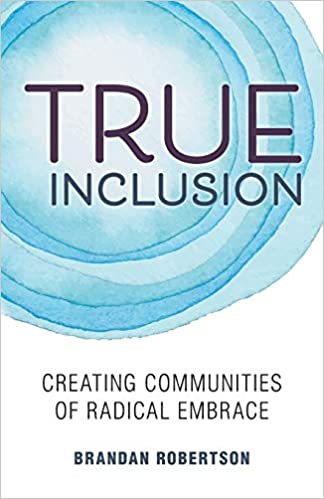by Brandan Robertson – Chalice Press

Learn more and purchase from:
Want to be truly inclusive? It’s more than flying a rainbow flag on your church doors.
So your church website says you’re welcoming, a rainbow flag flies out front, worship uses gender-inclusive language, and you make sure you greet the stranger next to you on Sunday mornings. But is all of that really enough? And what if those welcoming gestures actually keep visitors from returning and exclude dozens of other groups or people in your community?
In True Inclusion, public theologian and pastor Brandan Robertson shares how to move your church from mere welcome to radical embrace. Pointing to a clear biblical imperative for radical inclusivity in the sanctuary and in the public square, Robertson presents a paradigm-shifting vision of community, “where nothing is simple, nothing is easy, but everything is beautiful.” Learn practical, step-by-step approaches to becoming deeply, robustly, and richly inclusive of all people regardless of race, gender identity, sexual orientation, political affiliation, and socioeconomic status.
Written for people and communities at every stage of the journey, True Inclusion will challenge and inspire you to embody a gospel of radical embrace for all.
“Brandan is a crucial and courageous theologian working at the intersection between faith and LGBTQ equality. In True Inclusion, he delivers a strong, but much needed, challenge to all churches. He asks pastors and congregations to reassess how welcoming they truly are to LGBTQ people and other diverse demographics. Brandan calls out luke-warm attempts and fearful silence, asking instead for bold commitment. True Inclusion is an excellent handbook to help churches on their journey toward mirroring God’s radically inclusive love.“― Vicky Beeching, Speaker, LGBTQ Equality Campaigner & Author of Undivided: Coming Out, Becoming Whole and Living Free From Shame
“Robertson (Nomad), lead pastor of Missiongathering Christian Church in San Diego, Calif., draws on his life experience to offer ideas for creating a truly inclusive faith community. After being confronted by the administration of his Bible college about his “same-sex desires,” Robertson looked elsewhere for an inclusive Christian church that pursued the “good of the silenced, marginalized, and oppressed.” Now serving as an openly gay pastor, he shares how he has confronted homophobia throughout his life in order to break down a key misunderstanding: the notion that inclusivity is about tolerating other people. For Robertson, inclusivity isn’t about toleration, but about getting to know and love those who aren’t like you. “The spirit of true inclusion,” he writes, “is one that invites the full diversity of humanity into community so that we can learn, grow, and reflect the expansive, diverse God in whose image we are made.” Robertson provides carefully selected passages from Scripture to support his claims, and also dedicates a chapter to a searing critique of patriarchy (“The Bible and our faith come from the margins… how can we not be willing to allow the perspectives of the marginalized to inform and change our interpretation of Scripture?”). This challenging treatise, intended to ruffle feathers, is a much-needed salve in the current climate of polarization.”- Publishers Weekly, September 2018
“‘Inclusion,’ Robertson asserts, ‘is a fundamental human need, hardwired into our being from the time we are born.’ Yet, he notes, writing from his perspective as a gay clergyman, ‘No community has experienced such fierce exclusion from Christian communities than has the LGBT+ community.’ Why this should be so and why all those regarded as being ‘other’ are similarly excluded is due, simply, to fear, he hypothesizes, adding that it is love that expels any fear. In his more expansive treatment of the pernicious power of exclusion, he takes particular exception to the tradition of patriarchy, which, he says, is a system of ‘othering’ that infects ‘nearly every religious institution in the world’ and prevents inclusivity from flourishing. It is following in the footsteps of Jesus, ‘the renegade rabbi from Nazareth,’ that enables us to dismantle hierarchies. Despite his many concerns, Robertson is sanguine about the possibilities of true inclusion and devotes a chapter to the voices of other experts speaking about the realities of implementing inclusion. This is a challenging but compassionate view of a troubling reality that should inspire every community of believers.“―Booklist, August 2018
